By: Julian Blythe November 23, 2016
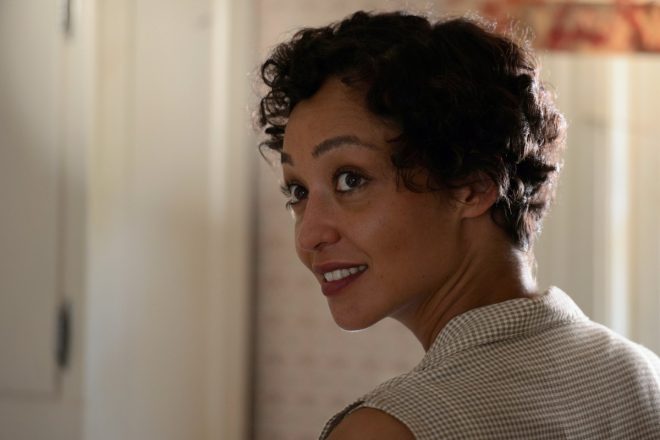
In Jeff Nichols new powerful biography drama, Loving, actress Ruth Negga taps into the quiet storm that was Mildred Loving, the wife who would help pave the way for legalizing interracial marriage in the United States. Ruth’s portrayal of Mildred gives us a window into what her relationship with Richard would have been like, as well as her natural reactions to 1960’s Virginia. With a convincing accent and calm demeanor, Ruth, who most may remember from her role in World War Z with Brad Pitt, delivers one of her best performances yet.
Q: How did you manage to pull off such a tough role?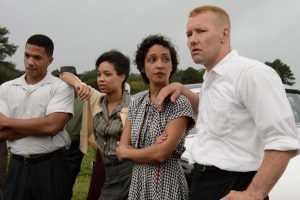
In terms of how I managed it, it’s a whole team. If felt like a very collaborative experience but I think it’s because Jeff (Nichols, Director) works with people who are – that’s in their nature. Collaboration. He’s a collaborator. From hair and make-up, to costumes, art design, art direction, props – we were all in it together. We all had the same goals (and) it was to do the best possible job in order to honor this couple. And I really enjoyed the creation of Mildred and Richard. It’s a privilege to really get your teeth into a role like this. It is something that is a challenge, but it is a brilliant challenge. There’s nothing casual about it.
There’s nothing casual about the way Jeff works, anyway. I think that’s quite clear from his oeuvre. It was a very special project for him and you can tell from being there. Joel (Edgerton, played husband Richard) and I were so happy to spend time with this couple that we adored. Toward the end of shooting, I remember we were feeling the same thing of ‘Oh no, we have to leave them soon.’ I was bereft when we finished filming because I’d already fallen in love with Mildred when I auditioned for her.
Q: How did you first hear about the part?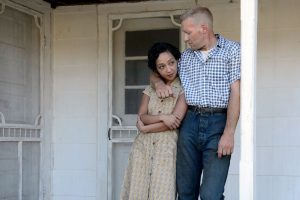
Jeff was in town. I think he was prepping or he was in post for Midnight Special and Francine Maisler who casts (his films) she put in my name. She said, ‘While you’re here why don’t you meet people and I was in town. Francine has been a big supporter of mine. She’s a fantastic lady and a fantastic casting director. I’m forever grateful to her.
Q: She discovered you?
She put my name forward. She cast me in 12 Years A Slave. I didn’t make it into the final cut. She remembered me, and Jeff sent me some scenes from his screenplay and along with that he sent me Nancy Buirski’s documentary The Loving Story, which I urge you to see. It’s beautiful. She’s an extraordinary woman – Nancy. She has a great spirit.
Q: What do you love about Jeff Nichols’ work? Is it the humanity that’s infused in his work, no matter what genre he tackles?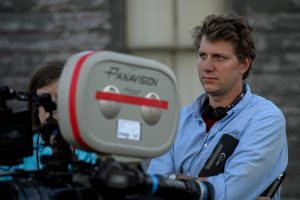
It’s big theme in his work. Humanity. I think he does this thing where he elevates the ordinary – the quotidian to sort of a greatness that actually we can miss and pass over if we don’t take the time to appreciate. Jeff likes the quiet stories, not because they’re not quiet in the sense of volume. We can let go of special things because they’re not really interesting. Jeff has this really knack for teasing out the grace and the extraordinariness of the ordinary. And I think all his films, he manages to – I don’t know, they’re all about different things but there is that sort of sense of beauty and other-worldness, etherealness. They are a celebration of humans in our everyday sort of garb. Ordinary people; I like that. That’s who Richard and Mildred were. They were ordinary people who were – I call them the everyday people.
Why their story resonates with so many people is that they see who shouts the loudest – we assume he’s the one that’s heard and he’s the one who makes all the changes. And that’s not necessarily true. Our voices are all equal in this. We’re all in it together. It champions those that might have been forgotten by history. Maybe sidelined or relegated for one reason or another to sort of footnotes. I think there are many Richards and Mildreds.
Q: So the documentary helped you prepare for the role and finding Mildred’s voice?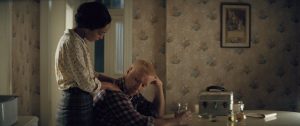
I have to say, Nancy’s documentary and all that archival footage that she managed to find was a gift. It was sort of a performance template. From a practical point of view, their physicality was specific to that time. Her voice, and what she sounded like – the dialect in that specific place in Virginia. It’s a dialect that’s specific to that area which has an oddness to it. The atmosphere of the time… The documentary – you get a very good sense of the tension of that time and what people were up against. Judge Brazille comparing people’s skin color to different birds mating. It’s so weird. That was really vital.
But also it was a joy, both Joel and I thought, “this couple, what a beautiful thing that they shared.” We realized that it was going to be really lovely to have in our lives. And it was – it was a very joyful time, a lot of it. Sometimes, I did find the outrage she felt on her behalf quite overwhelming and maddening and saddening. That didn’t paralyze me, but I did sort of have moments where I felt really angry.
Q: Richard and Mildred have a quiet strength about them.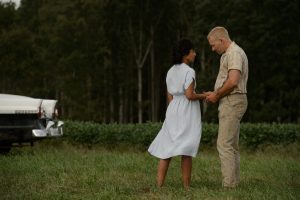
I think that’s why this couple challenged our preconceived notions of perceptions of strength or what we are taught strength is. I don’t think shyness or reservedness is incompatible with self-esteem. I really don’t. We may have been taught that because there is this idea that the bigger or louder we make ourselves – that is a sign of strength. For me, that’s smoke and mirrors. It’s kind of like The Wizard of Oz.
Mildred had tenacity, perseverance and self-belief in herself. Her desires were valid and they were as valid as the next person’s. I was so impressed by that, especially for that time. Especially for a woman of color for that time. I hope the conversation about what is strength does evolve.
For Richard, you know, he was sort of tripped up by the idea of what masculinity should be. It was also emasculating for him not to be able to protect family and protect his wife . . . you see that heartache and that heartbreak.
You see Mildred at the same time try and bolster him, which they do for one another. They were a source of strength for one another.
Q: How does it make you feel to be the talk of Oscar buzz? It’s inevitable.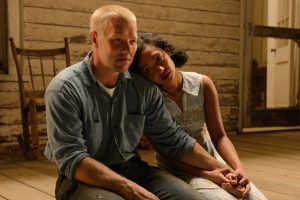
I don’t think anything is inevitable. I don’t know. I don’t think in those terms, really. I think it’s very nice for people to say nice things about your films and your work. Of course it is. It’s flattering. It’s lovely.
In terms of this film, what I find incredibly moving is people will find out about this couple. They’ll be introduced to Richard and Mildred and they’ll be better off for it. I certainly think I am. They really are inspirational. I think they will take their rightful place in this civil rights canon.
I think acting, sticking with this profession, takes a lot of stupidity [laughs]. Blind self-belief!
Q: Where did you study?
I trained at Trinity College in Dublin. At the Samuel Beckett Theater. A three-year course and then I started on the Abbey Stage.
Q: When did you make your move to the U.S.?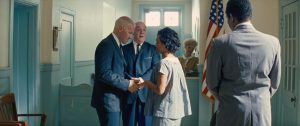
Not for a while. I did a lot of theater and television in Ireland before I moved to London. When I moved, you kind of had to be seen to be in London to be on people’s radar. But I think that’s completely changed now. You can live in Ireland and be an international actor now and that’s a great thing.
Loving is on theaters now.
Interview by Julian Blythe
Edited by: Jody Taylor – @RealJodyTaylor
Follow Us: What’s Up Hollywood at @WhatsUpHWood
